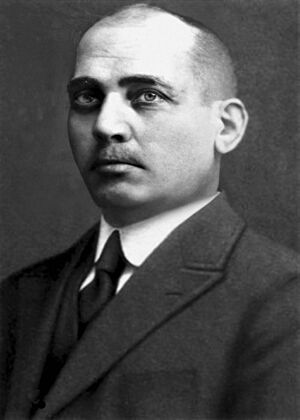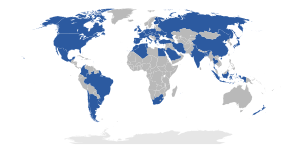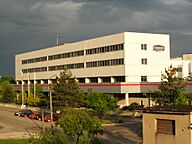Danone facts for kids
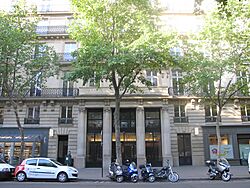
Danone head office in Paris, July 2010
|
|
|
Formerly
|
Boussois-Souchon-Neuvesel (1966-1967) BSN (1967-1973) BSN-Gervais Danone (1973-1983) BSN Groupe (1983-1994) |
|---|---|
| Public | |
| Traded as | Euronext Paris: BN CAC 40 component |
| Industry | Food processing |
| Predecessor | Gervais Danone |
| Founded | Company: 1966 (as Boussois-Souchon-Neuvesel) Brand: 1919 |
| Founder | Isaac Carasso |
| Headquarters | Boulevard Haussmann 9th arrondissement, Paris, France (Operational) Hoofddorp, Netherlands (Global) |
|
Area served
|
Worldwide |
|
Key people
|
Franck Riboud (honorary chairman) Gilles Schnepp (chairman) Antoine Bernard de Saint-Affrique (CEO) |
| Products |
|
| Brands | Main brands |
| Revenue | |
|
Operating income
|
|
| Total assets | |
| Total equity | |
| Owners |
|
|
Number of employees
|
96,000+ (2023) |
| Subsidiaries | Danone North America |
Danone S.A. (pronounced dan-own) is a big French company that makes food products. It is based in Paris, France. The company started in 1919 in Barcelona, Spain.
Danone is listed on the Euronext Paris stock market. This means you can buy shares of the company. In the United States, some of Danone's products are called Dannon.
In 2018, Danone sold its products in 120 different countries. That year, they made €24.65 billion in sales. A large part of their sales came from dairy and plant-based products, like yogurt. They also sold specialized nutrition products and bottled water.
Contents
History of Danone
How the Company Got Its Name
Danone was started by Isaac Carasso. He was a doctor from the Ottoman Empire. In 1919, he began making traditional yogurt in Barcelona, Spain.
He named the brand "Danone" after his son, Daniel Carasso. "Danone" means "little Daniel" in Catalan.
Moving and Growing the Business
In 1929, Isaac Carasso moved the company from Spain to France. He opened a new factory in Paris. Later, in 1942, Daniel Carasso moved the company to New York, USA.
In the United States, Daniel Carasso worked with Juan Metzger. They changed the brand name to "Dannon" so it would sound more American.
In 1951, Daniel Carasso went back to Paris. He took charge of the family businesses in France and Spain. The American business was sold in 1959. However, Danone bought it back in 1981.
In Europe, Danone joined with Gervais in 1967. Gervais was a top producer of fresh cheese in France. The new company became Gervais Danone.
Expanding into New Areas
In 1973, the company merged with Boussois-Souchon-Neuvesel (BSN). BSN was a company that made bottles. It was formed by combining two glass companies. One made flat glass for windows, and the other made bottles and jars.
Before this, BSN had already merged with other companies. These included Evian (known for water), Kronenbourg (a brewery), and Blédina (a baby food company).
In 1983, the company changed its name to Groupe Danone.
Focusing on Key Products (1970–2000)
At first, Danone bought companies that helped its glass-making business. For example, they bought Kronenbourg and Evian. These companies were big customers for BSN's bottles. This helped them have products to fill their bottles.
In 1973, Danone merged with Gervais Danone. They started to grow internationally. They also changed the Dannon yogurt brand in the U.S.
By 1979, the company stopped making glass. They sold their glass factories. In the late 1980s, Gervais Danone bought European biscuit makers. This included the famous LU brand.
In 1994, BSN changed its name to Groupe Danone. They used the name of their most famous international brand. In 1996, Franck Riboud took over as chairman and CEO from his father. Under him, the company focused on three main product groups: dairy, beverages, and cereals. They sold off other parts of the business that were not central to their goals.
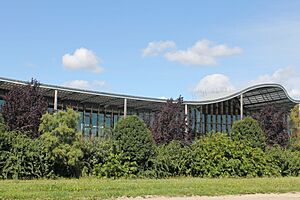
Between 1999 and 2003, the group sold most of its glass-container business.
Danone in the 21st Century
In 2000, Danone sold most of its European beer businesses. This included the Kronenbourg brand. They also sold their Italian cheese and meat businesses in 2002. Their beer businesses in China were also sold.
In 2004, Danone sold its British and Irish biscuit operations. In 2005 and 2006, they sold their sauces businesses in the UK, US, and Asia. Even with these sales, Danone continued to grow worldwide. They focused on products that promote health and well-being.
In 2007, Danone agreed to sell most of its biscuits division to Kraft Foods Inc. This included the LU and Prince brands. This deal was worth about €5.3 billion. Also in 2007, Danone made an offer to buy Numico. Numico was a Dutch company that made baby food and medical nutrition products. This deal was worth €12.3 billion. It made Danone the second-largest baby food maker in the world.
Focus on Dairy (2010–Present)
In 2009, the company changed its name from Groupe Danone to simply Danone.
In 2010, Danone entered the Russian market. They bought companies from OAO Unimilk. Unimilk had a 21% share of the Russian market. The combined Danone-Unimilk company became very large in the region.
Danone also bought the nutrition businesses of the Wockhardt group in India in 2012.
In 2013, Danone announced plans to reduce its European workforce. This was about 3.3% of their employees.
Since 2013, Danone has grown in Africa. They bought a large share in Centrale Danone in Morocco. They also invested in Fan Milk in West Africa and Brookside in Kenya.
In 2014, Franck Riboud stepped down as CEO. Emmanuel Faber took over his role.
In 2016, Danone was in 130 markets. They made US$25.7 billion in sales. More than half of these sales came from developing countries. In 2015, fresh dairy products made up 50% of their sales. Baby food was 22%, branded water 21%, and medical nutrition 7%.
In 2017, Franck Riboud became honorary chairman. Faber became chairman while also staying CEO.
In 2018, Danone changed the name of its DanoneWave company to Danone North America. This happened after they bought WhiteWave Foods in 2017.
In 2020, Danone announced that it would cut up to 2,000 jobs. This was part of a plan to reorganize the company.
In late 2020, a company called Bluebell Capital became a shareholder in Danone. They questioned Faber's leadership. They said Danone's stock market performance was "disappointing." After some difficult financial results, Faber left his position in March 2021.
On May 16, 2021, it was announced that Antoine Bernard de Saint-Affrique would be the next CEO of Danone. He started on September 15.
In 2023, Danone Manifesto Ventures invested in Wilk. This is an Israeli company that makes cell-based dairy and infant-milk products.
In July 2023, Russia took control of Danone's business in Russia. This happened after the Russian invasion of Ukraine. The Russian government put it under "temporary management." In February 2024, there were rumors that Ramzan Kadyrov or his nephew would take over the unit. On March 13, Vladimir Putin ended the temporary management order. This allowed the unit to be sold.
In May 2025, Danone announced that it bought a majority share in Kate Farms. This is an American company that specializes in medical nutrition. The amount of the deal was not shared.
How Danone is Managed
Head Office Location
Danone's main office has been in the 9th arrondissement of Paris since 2002.
Leaders and Board of Directors
Danone is led by a CEO and a chairman. It also has a board of directors. As of April 26, 2018, there were 16 members on the Board of Directors.
The executive committee members as of 2021 include:
- Antoine de Saint-Affrique (CEO)
- Juergen Esser (Chief Financial, Technology and Data Officer)
- Laurent Sacchi (General Secretary)
- Bertrand Austruy (Chief Human Resources Officer)
- Véronique Penchienati-Bosetta (Chief Executive Officer International)
- Vikram Agarwal (Chief Operating Officer end-to-end design to delivery)
- Shane Grant (Chief Executive Officer North America)
- Nigyar Makhmudova (Chief Growth Officer)
- Henri Bruxelles (Chief Sustainability and Strategic Business Development Officer)
- Floris Wesseling (President Europe)
Who Owns Danone
Danone is owned by many different investors. About 43% is owned by American investors. French investors own 19%. The UK owns 10%, Switzerland 6%, Germany 5%, and the rest of Europe owns 17%.
Main Brands of Danone
Danone has many different brands. Some are known all over the world, and some are popular in specific countries.
In 2018, Danone's international brands included: Activia, Actimel, Alpro, Oikos, Aptamil, Danette, Danimals, Danio, Dannon, Danonino, Evian, Nutricia, and Volvic.
Local or regional brands include: AQUA (Indonesia), Blédina (France), Bonafont (Mexico and Brazil), Cow & Gate (UK), Happy Family (USA), Horizon Organic (USA), Mizone (China and Indonesia), Prostokvashino (Russia), Protinex (India), Silk (USA), and Damavand (Iran).
Working with Other Companies
Danone often works with other companies. This is called a joint venture. They do this to grow, especially in fast-growing markets. More than half of Danone's sales come from these markets.
Danone has joint ventures with companies like Al Safi in Saudi Arabia (2001), Yakult in India (2005) and Vietnam (2006), Alquería in Colombia (2007), and Mengniu in China (2013–2014).
Australia
Danone Murray Goulburn is a joint venture in Australia. It works with Saputo Dairy Australia. They sell yogurt and other fresh dairy products in Australia. These products are made in Kiewa, Victoria.
Bangladesh
In 2005, Franck Riboud met Muhammad Yunus. He was the founder of the Grameen Bank and later won the Nobel Peace Prize. They talked about helping poor countries. In 2006, the Grameen Bank and Danone started a company called Grameen Danone Foods. This is a "social business" in Bangladesh.
Grameen Danone Foods makes a yogurt called Shokti Doi. This yogurt has protein, vitamins, iron, calcium, zinc, and other important nutrients. It helps children in Bangladesh get enough nutrition. Shokti Doi is sold at a very low price. This makes it affordable for the poorest families. The company's goal is to improve public health, create jobs, and help the environment. Any money they earn is put back into the business.
India
Danone started its nutrition business in India in 2012. They bought the nutrition products from the Wockhardt Group. Danone India offers special products for different ages. These include products for pregnant women, babies, young children, and adults. Some of their brands are Aptamil, Neocate, Farex, Protinex, Dexolac, and Nusobee. Their main office is in Mumbai. In 2018, Danone focused more on its nutrition products.
Israel
In 1996, Danone agreed to buy 20% of the Strauss Group. This is Israel's second-largest food maker. Strauss Dairies had worked with Danone since the 1970s.
Saudi Arabia
In 2001, Al-Safi and Danone started a partnership.
China
Danone has been investing in China since 1987. It is one of Danone's top 5 markets.
Bright Dairy
In 2001, Danone bought a small part of Bright Dairy. By 2006, they owned 20% of the company. This made them the third-largest shareholder. In 2007, Danone sold its share in Bright Dairy.
Wahaha
The Hangzhou Wahaha Group is China's largest beverage maker. In 1996, Wahaha and Danone started a joint venture for dairy products. Danone owned 51% of this venture.
However, in 2005, Danone found that other companies were making and selling drinks using the Wahaha brand illegally. Danone tried to buy a share in these other Wahaha companies, but the general manager, Zong Qinghou, refused. A disagreement started between Danone and Zong Qinghou.
In 2009, they reached an agreement. Danone left the joint venture and sold its shares to its Chinese partner.
Mengniu
On May 20, 2013, Danone announced a partnership with Mengniu. Mengniu is the top dairy company in China. Danone bought a 4.0% share in Mengniu. Later, Danone increased its share to 9.9%. By 2016, Danone was Mengniu's second-largest shareholder.
Also in May 2013, Danone and Mengniu created a joint venture. This was to help grow the fresh dairy product market.
In 2014, Danone, Mengniu, and Yashili signed an agreement. Danone invested €437 million in Yashili. After this, Mengniu owned 51.0% and Danone owned 25.0% of Yashili.
Russia
On June 18, 2010, Danone partnered with Unimilk. Unimilk was one of Russia's main milk producers. Danone and Unimilk combined their fresh dairy product businesses in Russia, Ukraine, Kazakhstan, and Belarus. This joint venture became the number one dairy company in that region. Russia became one of Danone's five most important markets.
In October 2022, Danone announced it would transfer its Russian business to new owners. Russia made up about 5% of the company's total income. In July 2023, the Russian government took control of Danone Russia's shares. They put it under state control. On July 18, Ibragim Zakriev was named the new General Director of Danone Russia. He is the Minister of Agriculture of Chechnya. As of July 26, 2023, Danone had set aside €700 million for the loss of its Russian business.
Africa
In June 2012, Danone increased its share in Centrale Laitière to 67.0%. Centrale Laitière is the top dairy company in Morocco. Danone and Centrale Laitière have worked together since 1953.
In October 2013, Danone worked with Abraaj Group. They bought FanMilk International. This company is a leading maker and seller of frozen dairy products and juices in several West African countries.
In July 2014, Danone announced it bought a 40% share in Kenya's Brookside. Brookside is East Africa's leading dairy products group.
Philippines
In October 2014, Danone partnered with Universal Robina. They worked together to build a beverage production and distribution business in the Philippines.
The Danone Institute
The Danone Institute is a non-profit organization. It was created to support research, information, and education about nutrition, diet, and public health. One of its main goals is to help medical professionals, educators, and parents learn more about nutrition.
Danone started its first Institute in Paris, France, in 1991. It officially became a private non-profit organization in 1997.
The institute is led by nutrition experts and Danone company leaders.
Danone Institutes Around the World
By 2007, Danone had set up 18 institutes in different countries. These institutes create programs to help with local public health issues. They are located in countries like Belgium, Canada, China, France, Germany, Japan, Mexico, Poland, Russia, Spain, and the United States.
These institutes work under the Danone Institute International. This international group helps guide the network. It also encourages sharing of knowledge between the different countries.
Today, more than 200 experts in diet and nutrition are part of this international network.
Each institute has a board of directors and a scientific council. The board sets the goals and budget. The scientific council makes decisions about future programs.
The institutes create educational programs for their countries. These programs deal with local health and nutrition issues. For example, the Czech Danone Institute provides money to support research and education in nutrition.
Each local Danone Institute develops specific programs. These include:
- Supporting research programs with scholarships and grants.
- Publishing research findings about health and nutrition.
- Organizing scientific conferences.
- Publishing newsletters and books for professionals.
- Holding workshops and training for professionals.
- Creating educational materials for parents and children.
- Sharing knowledge with the public.
The Danone Institutes are non-profit organizations. They bring together well-known scientists from independent organizations.
From 1991 to 2006, they gave out over 40 prizes and awards. More than 140 events brought together over 30,000 health care professionals. They also published 75 papers. Over 70 programs were organized for the public.
To date, Danone Institutes have funded more than 900 research projects. This is a total budget of €16 million. They have also created many educational programs and held 100 symposia.
Danone Institute International
The Danone Institute International was started in 2004. Its goal is to bring together the 18 Danone Institutes. It aims to create large international programs. It also encourages sharing knowledge between the local institutes. It helps scientists work together and share ideas.
The Danone Institute International is a non-profit organization. It was started with money from Danone. The group helps share information about how diet, nutrition, and health are connected.
The Danone Institute International has over 220 scientific experts. This network includes scientists from different fields. These include clinical nutrition, pediatric medicine, microbiology, and gastroenterology.
The Danone Institute International publishes papers. It supports research through grants and a special prize. It also organizes international scientific conferences.
The Danone International Prize For Nutrition is a very important part of the Danone Institute International's work.
Danone International Prize for Nutrition
The Danone International Prize for Nutrition is an award started in 1997. It is given every two years. It honors people or teams who have made big advances in the science of human nutrition.
The prize encourages nutrition research. It also helps people understand how important this field is.
This award is one of the most respected awards in nutrition research. Many leading scientists have received this award for their achievements.
The Danone International Prize for Nutrition is worth €120,000. The Danone Institute International gives out the prize every two years. It is supported by the French organization Fondation pour la Recherche Médicale.
The prize recognizes a single researcher or a research team. It is for those who have made a major step in nutrition. This includes developing new ideas that can help many people.
The jury for the prize has up to nine members. They select one winner by a secret vote.
In 2007, the Danone Institute International chose Friedman. This was after looking at over 650 applicants from around the world. Winners are chosen after an independent international selection process.
This prize was renamed the Danone International Prize for Alimentation in 2018.
Prize winners:
- 2016 Philip Calder, for his great work on nutrition and immunity.
- 2013 Gökhan S. Hotamisligil, for his great research in immunology and metabolic diseases.
- 2011 Jeffery I. Gordon, for his great work on the human gut microbiome, diet, and nutrition.
- 2009 Johan Auwerx, for his research in molecular nutrition.
- 2007 Jeffrey M. Friedman, for research on genetics and leptin in body-weight regulation.
- 2005 David J. P. Barker, for his "fetal origins hypothesis."
- 2003 Ricardo Bressani, for his work on understanding the nutritional value of local foods.
- 2001 Alfred Sommer and team, for their work on Vitamin A deficiency.
- 1999 Leif Hallberg, for his work on iron metabolism.
- 1997 Vernon R. Young, for his work on protein and amino acids metabolism.
Global Summit on the Health Effects of Yogurt
In 2012, the Danone Institute International worked with the American Society for Nutrition (ASN). They organized an international group to study the health effects of yogurt. They shared their scientific findings with health professionals and the public. One year later, ASN and the Danone Institute International launched the first global summit on the health effects of yogurt.
This event aims to review the latest science on eating yogurt and its impact on public health.
The first summit was held in 2013 in Boston. It included experts in medicine and nutrition from around the world. Since then, summits have been held every year.
Yogurt in Nutrition Initiative for a Balanced Diet
In 2013, the Danone Institute International, the American Society for Nutrition (ASN), and the Nutrition Society (NS) started the Yogurt in Nutrition Initiative for a balanced diet. This program studies the health effects of yogurt. It encourages research about yogurt as part of a healthy diet. It also shares scientific information with health professionals and the public.
Through this project, the Danone Institute International organizes conferences worldwide. These conferences share researchers' findings. Since 2013, the Yogurt in Nutrition Initiative has co-organized the Global Summit on the Health Effects of Yogurt every year.
The Danone Institute International also works with the American Society for Nutrition and the International Osteoporosis Foundation. They organize the Yogurt in Nutrition Award. This award is worth US$30,000. It supports projects that focus on how yogurt can help prevent and manage diseases. It funds research programs for two years. It recognizes individuals or research teams from public organizations, universities, or hospitals.
Helping Communities and the Environment
Danone has several programs to help communities and the environment.
- danone.communities: Started in 2007, this fund helps social businesses.
- Danone Ecosystem Fund: Created in 2009, this fund supports Danone's partners. These include farmers, suppliers, and vendors.
- Livelihoods: Started in 2011, this fund helps environmental projects. These include projects related to farming, stopping deforestation, and providing energy in developing countries. In return, investors get carbon credits.
Danone's programs for helping society were influenced by former CEO, Antoine Riboud. He gave a famous speech in 1972. In this speech, he said that a company's growth should also include social responsibility. He was one of the first CEOs to say that companies should care about people and the environment. These ideas led to Danone's "dual project" – focusing on both economic and social goals.
In 2020, Danone announced that by 2025, all of its eggs would come from cage-free suppliers.
Images for kids
-
Silk oat milk
-
Aqua (Indonesia) Bottled water
See also
 In Spanish: Grupo Danone para niños
In Spanish: Grupo Danone para niños
- Danone Nations Cup
 | Misty Copeland |
 | Raven Wilkinson |
 | Debra Austin |
 | Aesha Ash |



